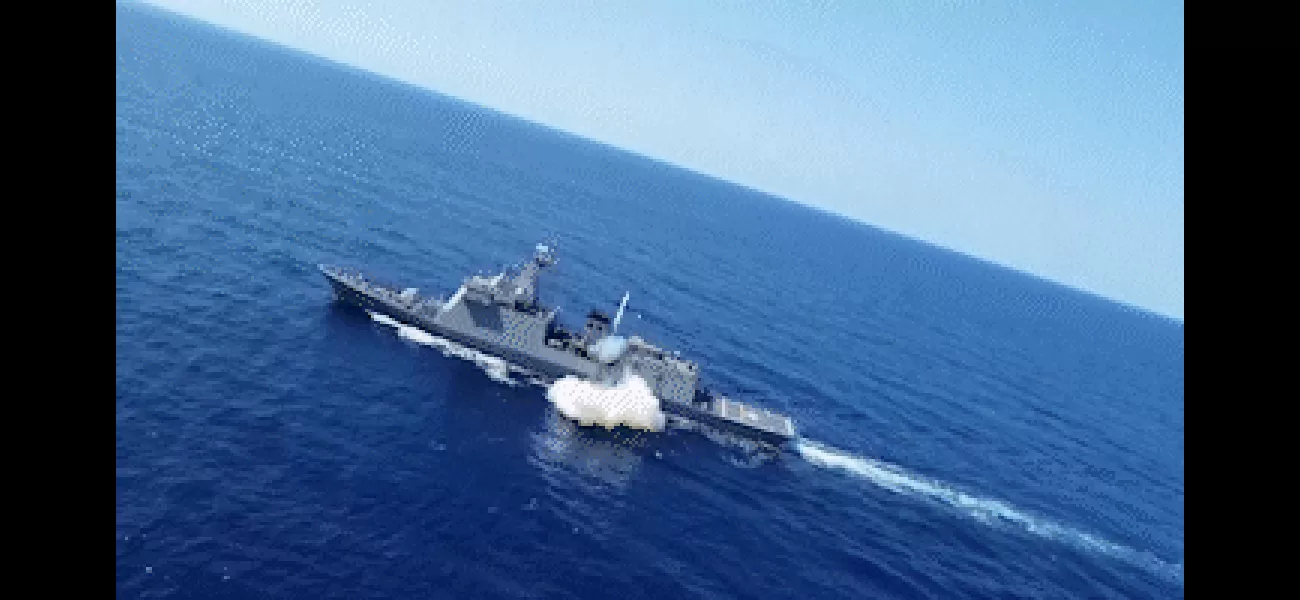Australia takes part in intense military exercise, resulting in the sinking of a ship.
"Beijing angered by war drills in South China Sea amid rising tensions."
May 9th 2024.

The recent joint military exercises between the US, Philippines, and Australia have caused quite a stir among China. With an Australian air force surveillance aircraft providing support, the forces conducted a series of intense exercises involving rockets, artillery fire, and airstrikes. The highlight of the drills was the sinking of a mock enemy ship, witnessed by military officials and diplomats from various countries, including the Philippine President, in his home province.
The annual combat-readiness drills, known as Balikatan, saw over 16,000 military personnel from the US, Philippines, and a few hundred Australian troops, along with observers from 14 countries, coming together. The exercises, which began on April 22 and ended on Friday, were designed to simulate a foreign invasion of the Philippines. This display of military prowess is a clear indication of the growing alliance between the US and Philippines, which was established in the 1950s, amidst their concerns over China's aggressive actions in disputed territories in Asia.
In line with this, Philippine President Ferdinand Marcos Jr. has directed his military to shift its focus from domestic anti-insurgency operations to external defense, given the increasing threat from China in the South China Sea. This aligns with the efforts of US President Joe Biden and his administration to strengthen alliances in the Indo-Pacific region to counter China's actions. China's repeated harassment of Philippine naval and coast guard ships in the disputed waters, using powerful water cannons and military-grade lasers, has caused minor collisions and injuries among Filipino navy personnel.
Philippine Ambassador to Washington Jose Romualdez expressed his concern, saying, "We're under the gun. We don't have the resources to fight against these bullying tactics from China. That's why we have turned to the US and other allies who share our belief in standing up to China." China, on the other hand, has accused the Philippines of initiating hostilities in the disputed waters by encroaching on what they claim to be their sovereign territory. However, the Philippines has repeatedly cited a 2016 international arbitration ruling that invalidated China's claim based on historical grounds.
During the exercises, the mock enemy ship, made in China but decommissioned by the Philippine navy in 2020, was hit repeatedly by missile and artillery fire and eventually sank, engulfed in black smoke. The drills were not directed at any specific country, as stated by Philippine military officials. However, China has opposed these exercises and has warned against any actions that may escalate tensions and endanger regional stability. This is the first time in years that such exercises were conducted near the Spratly Islands, a fiercely contested area guarded by China's coast guard and navy.
In addition to these exercises, US and Filipino marines also carried out a practice mission to secure an airfield near southern Taiwan. A group of journalists, including those from the AP, was invited to witness the air and ground combat maneuvers. British Defense Attaché to Manila, Bea Walcot, who watched the ship-sinking drill, stated, "They're not operating in safe areas. They're operating slightly further to the western bounds and they're doing that to practice in ways that they might have to work for real." This statement highlights the seriousness of the situation and the need for countries to be prepared for any potential conflicts in the region.
As tensions between the US and China continue to rise, with China's aggressive actions in the South China Sea and its goal to annex Taiwan by force, the Philippines has opened its doors to a stronger US military presence. This move, approved by President Marcos last year, allows US forces to use four more Philippine military camps as staging grounds and surveillance posts. This was a significant shift from the previous President, Rodrigo Duterte, who feared that a larger US military presence would provoke China. However, China has strongly opposed this move, warning against any actions that may harm its security and territorial interests.
In response, the Philippines has asserted its right to defend its sovereignty and territorial interests, stating, "An alliance is essential to show China that they may have all the ships, but we have the firepower to sink them." The joint military exercises and the strengthening of alliances between the US and its allies are crucial in sending a strong message to China and maintaining peace and stability in the region.
The annual combat-readiness drills, known as Balikatan, saw over 16,000 military personnel from the US, Philippines, and a few hundred Australian troops, along with observers from 14 countries, coming together. The exercises, which began on April 22 and ended on Friday, were designed to simulate a foreign invasion of the Philippines. This display of military prowess is a clear indication of the growing alliance between the US and Philippines, which was established in the 1950s, amidst their concerns over China's aggressive actions in disputed territories in Asia.
In line with this, Philippine President Ferdinand Marcos Jr. has directed his military to shift its focus from domestic anti-insurgency operations to external defense, given the increasing threat from China in the South China Sea. This aligns with the efforts of US President Joe Biden and his administration to strengthen alliances in the Indo-Pacific region to counter China's actions. China's repeated harassment of Philippine naval and coast guard ships in the disputed waters, using powerful water cannons and military-grade lasers, has caused minor collisions and injuries among Filipino navy personnel.
Philippine Ambassador to Washington Jose Romualdez expressed his concern, saying, "We're under the gun. We don't have the resources to fight against these bullying tactics from China. That's why we have turned to the US and other allies who share our belief in standing up to China." China, on the other hand, has accused the Philippines of initiating hostilities in the disputed waters by encroaching on what they claim to be their sovereign territory. However, the Philippines has repeatedly cited a 2016 international arbitration ruling that invalidated China's claim based on historical grounds.
During the exercises, the mock enemy ship, made in China but decommissioned by the Philippine navy in 2020, was hit repeatedly by missile and artillery fire and eventually sank, engulfed in black smoke. The drills were not directed at any specific country, as stated by Philippine military officials. However, China has opposed these exercises and has warned against any actions that may escalate tensions and endanger regional stability. This is the first time in years that such exercises were conducted near the Spratly Islands, a fiercely contested area guarded by China's coast guard and navy.
In addition to these exercises, US and Filipino marines also carried out a practice mission to secure an airfield near southern Taiwan. A group of journalists, including those from the AP, was invited to witness the air and ground combat maneuvers. British Defense Attaché to Manila, Bea Walcot, who watched the ship-sinking drill, stated, "They're not operating in safe areas. They're operating slightly further to the western bounds and they're doing that to practice in ways that they might have to work for real." This statement highlights the seriousness of the situation and the need for countries to be prepared for any potential conflicts in the region.
As tensions between the US and China continue to rise, with China's aggressive actions in the South China Sea and its goal to annex Taiwan by force, the Philippines has opened its doors to a stronger US military presence. This move, approved by President Marcos last year, allows US forces to use four more Philippine military camps as staging grounds and surveillance posts. This was a significant shift from the previous President, Rodrigo Duterte, who feared that a larger US military presence would provoke China. However, China has strongly opposed this move, warning against any actions that may harm its security and territorial interests.
In response, the Philippines has asserted its right to defend its sovereignty and territorial interests, stating, "An alliance is essential to show China that they may have all the ships, but we have the firepower to sink them." The joint military exercises and the strengthening of alliances between the US and its allies are crucial in sending a strong message to China and maintaining peace and stability in the region.
[This article has been trending online recently and has been generated with AI. Your feed is customized.]
[Generative AI is experimental.]
0
0
Submit Comment





